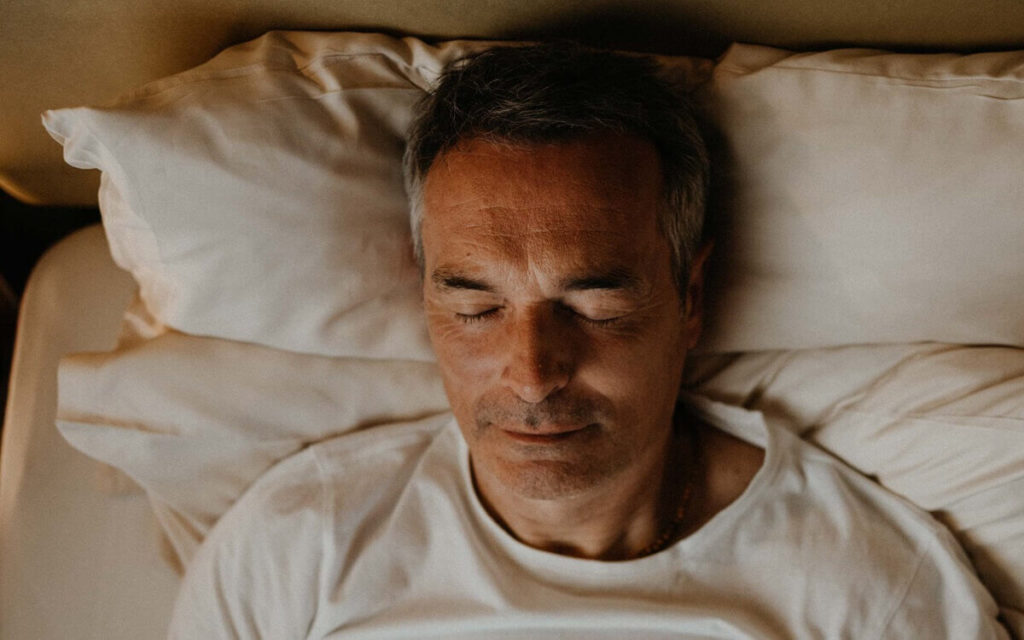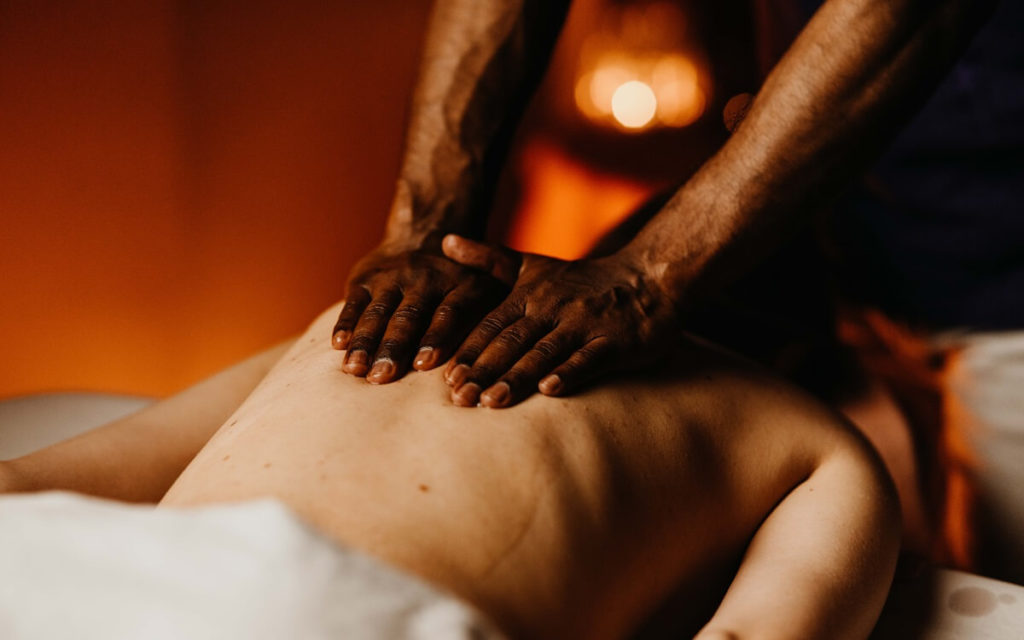Schlaf ist für den menschlichen Organismus überlebenswichtig. Ohne die nächtliche Zeit für Ruhe und Regeneration würde der Körper bald keine Energie mehr haben. Die Ursachen sind dabei vielfältig. In diesem Beitrag erfährst Du 6 Tipps, wie Ayurveda bei Schlafstörungen helfen kann.
Das Wichtigste in Kürze: Besser schlafen mit Ayurveda
Eine erholsame Nachtruhe ist ausschlaggebend für einen gesunden Körper und Geist. Anhaltende Schlafprobleme können ganz unterschiedliche Ursachen haben und sich psychisch und physisch auf Dich auswirken.
Im Ayurveda wird versucht, Schlafprobleme ganzheitlich zu behandeln. Oft hilft es, die eigene Lebensweise umzustellen. Diese 6 ayurvedischen Tipps können zu besserem Schlaf helfen:
- ayurvedische Ernährung mit Vata-reduzierenden Lebensmitteln einführen
- Routinen am Abend einhalten
- Yoga, Meditationsübungen und Atemübungen praktizieren
- gesunden Schlafrhythmus finden
- entspannende Massagen mit Ölen genießen
- mit einer Ayurveda-Kur und Kräutern zu innerem Gleichgewicht kommen
Warum erholsamer Schlaf so wichtig ist
Beim Schlafen erholt sich Dein Körper und er hat die Zeit, sich zu regenerieren. Dabei versorgt er Dich auch mit der notwendigen Energie für den Alltag. Schlaflosigkeit ist nicht nur anstrengend für Deinen Körper, sondern kann auf Dauer zu zahlreichen Beschwerden führen.


Die folgenden Symptome von Schlaflosigkeit gehören zu den häufigsten Beschwerden:
- Abgeschlagenheit
- Trägheit
- Nervosität
- Gereiztheit
- Leistungs- und Konzentrationsschwäche
- Ständiges Frieren
- Erhöhte Schmerzempfindlichkeit
- Depressive Verstimmungen
Bis zu 30 % der Bevölkerung leidet unter Schlafproblemen. Dabei kosten eine zu kurze Schlafdauer und unregelmäßige Schlafenszeiten zwischen zwei und fünf Jahren Lebenszeit. Ayurveda bekämpft nicht nur die Insomnie-Symptome, sondern geht der Ursache für die Schlafprobleme auf den Grund.
Schlafstörungen im Ayurveda: Schlafqualität in Zusammenhang mit den Doshas
Im Ayurveda haben Schlafstörungen verschiedene Ursachen, Dein Konstitutionstyp ist aber immer die Ausgangslage. Häufig ist eine Störung von Vata die Ursache für Schlafprobleme.


Abhängig davon, welches der drei Doshas Dich dominiert, wirkt sich das auf die Länge und Qualität Deines Schlafes aus.
- Vata-Typen benötigen mit mindestens acht Stunden am meisten Schlaf. Diese Konstitution hat üblicherweise einen leichten und oftmals unterbrochenen Schlaf.
- Pitta-Typen kommen hingegen mit sechs bis sieben Stunden Schlaf aus, der zwar kürzer, aber erholsamer ist.
- Gesunde Kapha-Typen haben einen tiefen Schlaf, aus dem sie nur schwer zu wecken sind.
Symptome bei Vata-Ungleichgewicht
Die Störung von Vata zeigt sich durch steife Gelenke, Probleme mit dem Rücken sowie Verstopfung. Die Symptome machen sich durch einen unruhigen Schlaf sowie Probleme beim Einschlafen bemerkbar. Darin ähnelt sie psychischem Stress.
Die optimale Zeit für Vata liegt zwischen zwei und sechs Uhr nachts. Leidest Du an einer Vata-dominierten Schlafstörung, wirst Du vor allem während dieses Zeitraums aufwachen. In diesen Wachphasen werden Betroffene oft von geistiger Unruhe, Sorgen und Ängsten sowie kreisenden Gedanken geplagt.
Symptome bei Pitta-Ungleichgewicht
Auch ein gestörtes Pitta kann für einen unruhigen Schlaf sorgen. Dabei stellt vor allem das Einschlafen ein Problem dar und der Zeitraum zwischen Mitternacht und zwei Uhr gestaltet sich sehr unruhig. Das Ungleichgewicht ähnelt emotionalem Trauma, was zu den Wachphasen führt.


Auch wenn Du schnell einschlafen kannst, wachst Du häufig mit Herzklopfen, Körperschmerzen und Emotionen wie Angst, Wut oder Traurigkeit auf. Ein weiteres Symptom ist eine “get up and go”-Stimmung, bei der Du vor dem Morgengrauen aufwachst und anschließend nur schwer einschlafen kannst.
Symtome bei Kapha-Ungleichgewicht
Wenn ein Kapha-Ungleichgewicht der Grund für Deine Schlafprobleme ist, passiert es häufig, dass Du am frühen Morgen erwachst oder komplett durchschläfst. Trotzdem stehst Du meistens mit einem trägen, müden Gefühl auf und fühlst Dich völlig erschöpft. Die Länge des Schlafes spielt bei den Betroffenen in der Regel keine Rolle.
Ursachen für Schlafprobleme im Überblick
Diese Dysbalancen der Doshas haben verschiedene Ursachen. Ziel im Ayurveda ist es, diese aufzudecken und ganzheitlich zu behandeln. Schlafprobleme können verursacht werden durch:
Psychische Ursachen
- Sorgen
- Kummer
- Ärger
- Angst
Stressfaktoren
- Überarbeitung
- emotionaler oder physischer Stress
Fehlender Biorhythmus
- Schicht- und Wechseldienst
- (Zu) Spätes Schlafengehen
- Störfelder am Schlafplatz (Geopathie, Elektrosmog, Mobilfunk)
Stimulanzien
- Koffein
- Nikotin
- Alkohol
- Drogen
- Medikamente
Ernährungsgewohnheiten
- Spätes, schweres Abendessen
- Fasten
Physische Krankheiten
- Schilddrüsenüberfunktion
- Bluthochdruck
- Wechseljahre
- Apnoe-Syndrom
Ayurveda bei Schlafstörungen: 6 Tipps für einen besseren Schlaf
Der ayurvedische Ansatz bei der Behandlung einer Schlafstörung ist die langfristige Veränderung oder Anpassung Deines Lebensstils. Dazu gehören beispielsweise Routinen, um Deinen Körper vor dem Schlafen zu beruhigen. Warmes Wasser, spezielle Kräuter und Massagen mit Ölen wirken entspannend und begünstigen einen guten Schlaf.


Tipp #1: Vata reduzieren
Da ein Vata-Überschuss oft die Ursache für Schlafprobleme ist, sind Vata-reduzierende Lebensmittel ein erster Schritt für besseren Schlaf. Warme, befeuchtende, nährende, beruhigende, befriedigende und erdende Speisen wirken sich langfristig positiv auf Deinen Schlaf aus.
Die folgenden Lebensmittel helfen zusätzlich, Vata zu beruhigen:
- Reis- und Nudelgerichte
- Milchbrei oder Milchreis
- Gedünstetes (warmes) Gemüse
- Warme und nahrhafte Suppen
Auch eine entspannende Goldene Ruhe Abendmilch kann Deinen Geist beruhigen und einen erholsamen Schlaf fördern.


Entdecke jetzt die Goldene Ruhe Abendmilch im European Ayurveda® Onlineshop
Entdecke jetzt das Kochbuch „Es geht mir richtig gut mit Ayurveda“ für zu Hause – mit 60 einfachen und gesunden Rezepten vom European Ayurveda Resort Sonnhof!
Versuche, regelmäßige Essenszeiten einzuhalten, die zu Deinem Konstitutionstyp passen. Das Abendessen sollte außerdem leicht verdaulich sein und nicht zu spät eingenommen werden. So hat Dein Körper vor dem Schlafengehen Zeit, die Kost zu verdauen und hält Dich nicht während der Nacht wach.
Tipp #2: Ayurveda Routine zum Entspannen
Im Ayurveda werden bestimmte Routinen empfohlen, die den Schlafrhythmus verbessern und für mehr Energie sorgen. Besonders ausreichende Bewegung wie Laufen, Radfahren oder Wandern wirkt sich positiv auf den Schlaf aus. Ein kleiner Spaziergang oder eine kurze Gehmeditation vor dem Zubettgehen hilft ebenfalls beim Einschlafen.
Achte darauf, mindestens zwei Stunden vor dem Schlafengehen und nicht nach 20 Uhr zu essen. Langes Fernsehen, schwierige Gespräche sowie Arbeiten oder Lernen am Abend wirken sich negativ auf den Schlaf aus. Besser sind kleine Meditationsübungen oder autogenes Training. Das sorgt für Entspannung und mindert Stress.


Stressmanagement mit Ayurveda: Definition und Methoden
Stress: Für die meisten Menschen ist dieses unangenehme Gefühl im Beruf, im Familienalltag oder durch soziale Verpflichtungen ein täglicher Begleiter. Hier findest du wertvolle Tipps und Methoden für effektives Stressmanagement mit Ayurveda.
Tipp #3: Yoga, Meditation und Atemübungen
Indem Du in Deiner abendlichen Routine leichte Yoga-Einheiten einbaust, gibst Du Deinem Körper die Möglichkeit, sich zu entspannen. Achte auf die bewusste Ausführung der Übungen und eine ruhige Atmung. Gerade der Baum, der Krieger und der Halbmond sind tolle Yoga-Übungen vor dem Schlafengehen.
Auch Meditation und Atemübungen helfen beim Einschlafen und verbessern die Schlafqualität. Achte auch hier darauf, die Übungen fließend auszuführen und langsam zu atmen. Profitiere von einem beruhigten Nervensystem und mehr Ausgeglichenheit.
Tipp #4: Gesunder Schlafrhythmus
Ausschlaggebend für guten Schlaf ist der Schlafrhythmus. Zwischen 18 und 22 Uhr dominiert Kapha, dessen erdende und schwere Energie beim Einschlafen hilft. Gerade wenn Du Probleme mit dem Einschlafen hast, solltest Du nach Möglichkeit vor 22 Uhr ins Bett gehen.
Tipp #5: Körper mit Öl massieren und reinigen
Eine Selbstmassage mit Öl – am besten dem Massageöl Innere Ruhe – oder Ghee hat eine beruhigende Wirkung auf Dich und Deinen Körper. Vor allem Nacken, Hand und Füße sind Druckpunkte, die den gesamten Körper entspannen können.


Ein Öleinlauf ist eine wohltuende Behandlung bei Schlafstörungen. Ein kleiner Öleinlauf, zwei- bis dreimal die Woche, kann Deine Schlafprobleme erheblich verbessern. Das wärmende Öl senkt Vata und beruhigt den Darm und das Nervensystem. Das Öl bleibt über Nacht in Deinem Körper und wird mit dem nächsten Stuhlgang ausgeschieden.
Bevor Du einen Öleinlauf durchführst, solltest Du unbedingt Rücksprache mit einem ayurvedischen Experten halten. Dieser hilft Dir dabei, den Öleinlauf individuell auf die Bedürfnisse Deiner Doshas anzupassen.
Tipp #6: Ayurvedische Kuren und Kräuter bei Schlafstörungen
Eine tolle Möglichkeit, Schlafstörungen zu behandeln, sind ayurvedische Kuren. Dabei wird Körper und Geist gereinigt, was zu mehr Ruhe und Entspannung führt. Bei der Panchakarma Kur werden beispielsweise typische Symptome von Schlafstörungen behandelt.
Du möchtest Dich von negativen Denkweisen befreien und das schlafraubende Gedankenkarussell stoppen? Dann könnte auch unser Mental- & Mind-Detox© die richtige Kur für Dich sein. Befreie Deine Gedanken und schlafe endlich wieder durch.
Dein Ayurveda-Experte kann Dir außerdem gesunde Kräuterpräparate – wie die Innere Ruhe Kapseln – empfehlen, die Deine Doshas ins Gleichgewicht bringen. Das wirkt sich zusätzlich positiv auf Deinen physischen und psychischen Zustand aus. Zu den beruhigenden ayurvedischen Kräutern gehören Guduchi, Ashwagandha und Brahmi. Sie helfen gegen Stress und besänftigen Deinen Geist.


Was tun gegen Müdigkeit?
Ob nach einer unruhigen Nacht, einem anstrengenden Meeting oder nach einem ausgiebigen Essen. Die Müdigkeit kommt oft schneller als erwartet. Wir verraten Dir hier 10 Tipps, wie Du Deine Energiespeicher dank Ayurveda wieder auffüllen kannst.




